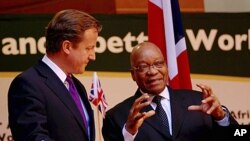South African President Jacob Zuma and British Prime Minister David Cameron agree that the people of Libya must be central in deciding their own future. However, the two leaders disagree on when and how Moammar Gadhafi should step aside.
Prime Minister Cameron is in South Africa on a trade mission. But in a media briefing following a meeting with President Zuma, it became clear that the future of Libya and its embattled leader were high on the agenda. Cameron said he had important areas of agreement with Zuma.
“But we are agreed on the immediate imperative that all sides must take every effort to avoid the loss of civilian life, we agree on the process needed, that the only safe and peaceful solution lies through a political transition, led and owned by the Libyan people, and backed by the United Nations, and we agree on the ultimate destination that Gadhafi must step aside to allow the people of Libya to decide their own future in a democratic and united Libya,” Cameron said.
But the British leader said he has a fundamental difference with Zuma. “The difference is that the president sees that [Gadhafi's departure] as the outcome of a political process," Cameron stated. "Whereas I believe for a political process to work it has to be the starting point. That is the difference between us, that is the gap.”
Zuma restated the African Union position that a cease-fire needs to be in place and that the NATO military missions cease before talks can begin. He said it would be possible for the international community to police a cease-fire.
“But if we allowed the peace process, which is very clear, which involves the global players -- AU, UN, EU, NATO, everybody -- and we don't think we would fail to find a mechanism that could in fact have a cease-fire that could exist and be respected, and monitored by all, while it is allowing the process to debate all the necessary issues including the future of Gadhafi. That is where we differ,” Zuma said.
From South Africa Cameron travels to Nigeria. He had planned a longer trip in Africa, but is cutting it short to deal with the phone hacking scandal that is rocking Britain's media and political establishment.
Zuma, Cameron Differ on Timing of Gadhafi Departure




